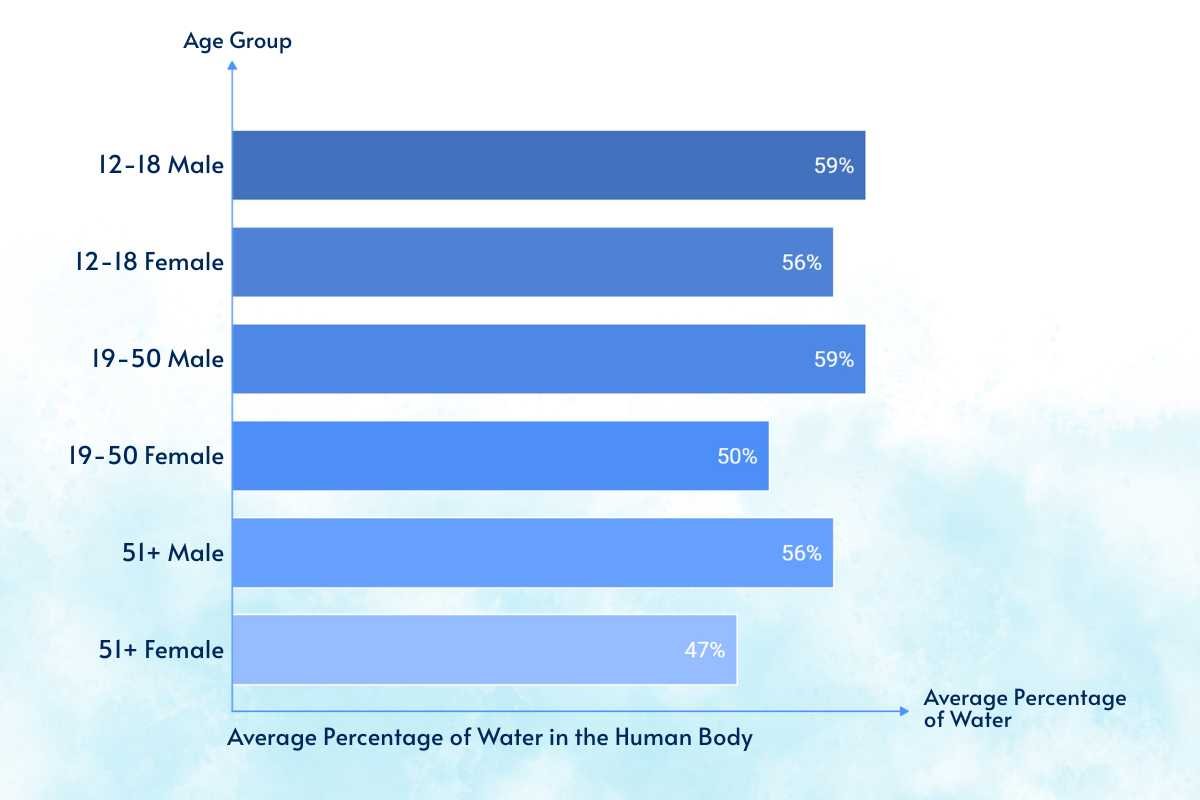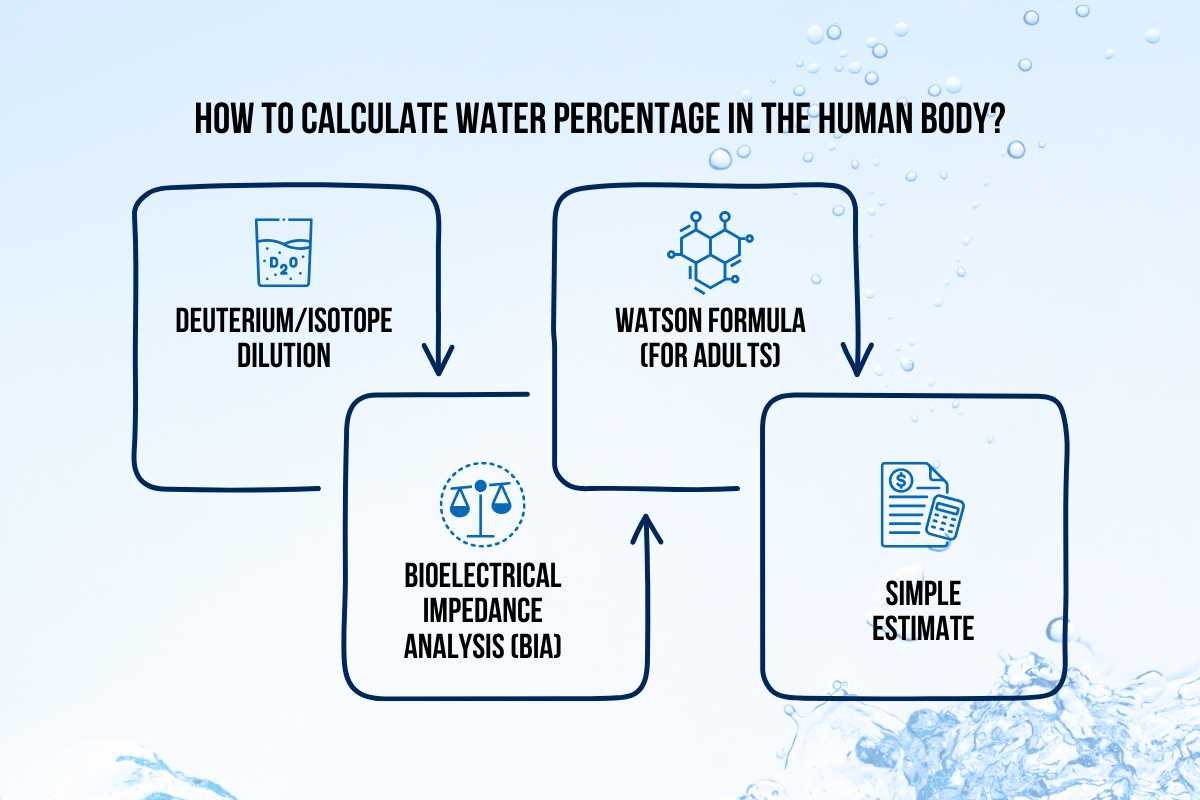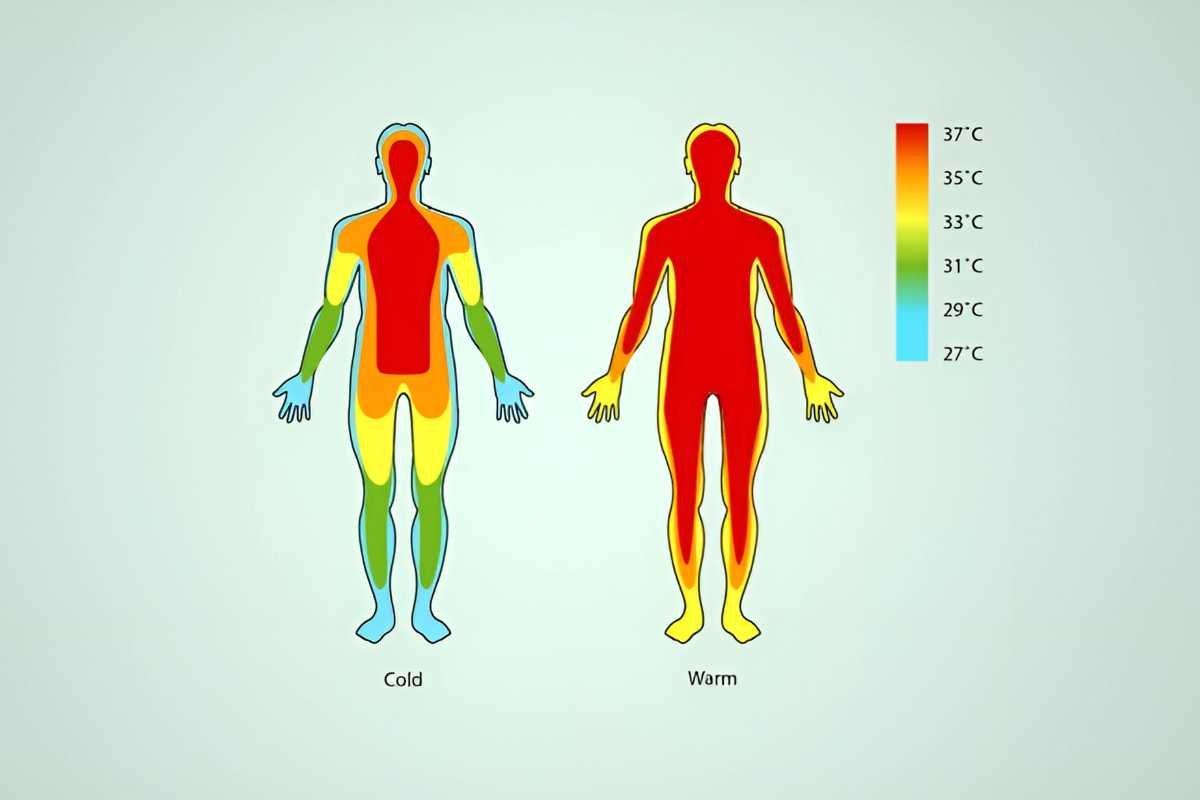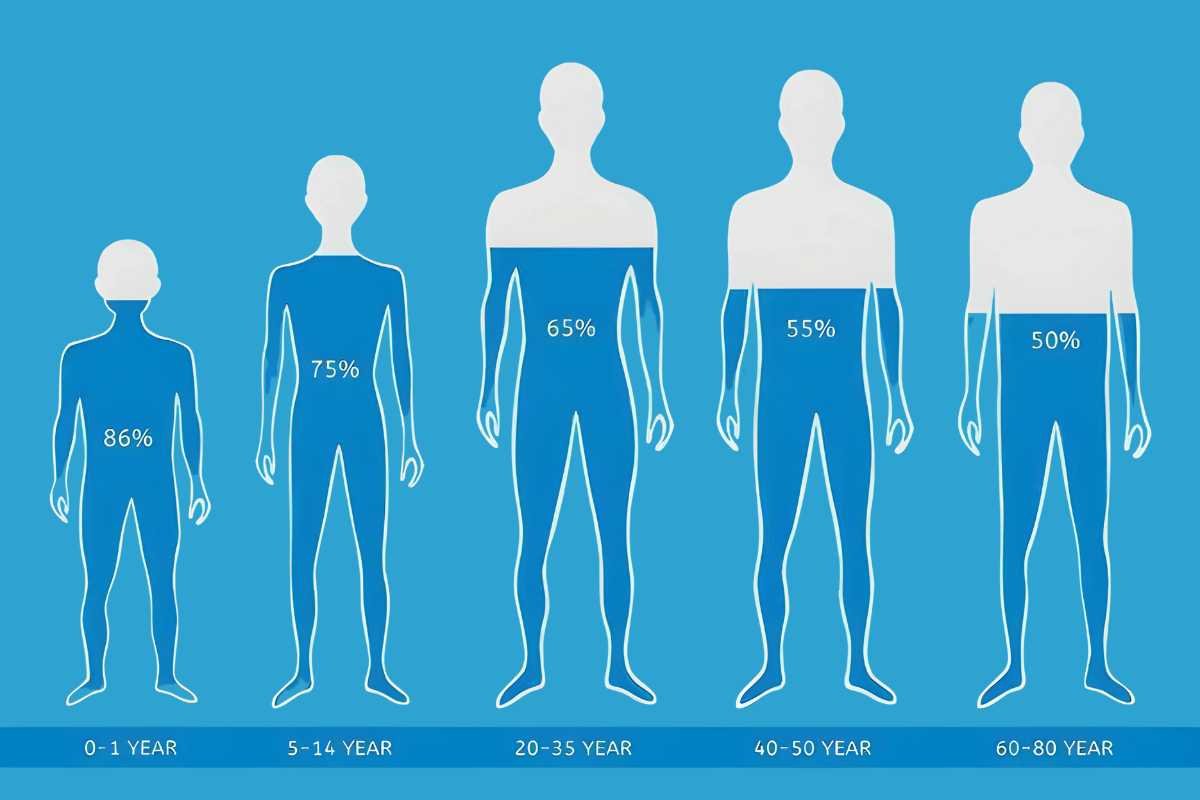We have all heard how the human body is 75% water, but is it true? Where do we get this percentage from? And most importantly, where is all this water stored? This is exactly what we will try to answer in this blog.
The average percentage of water in the human body varies between 45 to 60%. It is affected by your age, gender, and hydration level.
In this blog, we shall go through this a little deeper and try to understand the science behind the water in the human body.
What is the Average Percentage of Water in the Human Body?
The percentage of water in your body depends on your age and sex. In the table below, you can see the water percentage in adult males and females.

| Age Group | Male | Female | ||
| Average | Range | Average | Range | |
| 12–18 | 59% | 52–66% | 56% | 49–63% |
| 19–50 | 59% | 43–73% | 50% | 41–60% |
| 51+ | 56% | 47–67% | 47% | 39–57% |
Body size, shape, and balance of muscle and fat can all affect the average percentage of water in the human body.
So, you must be wondering, where do we get the 75% from? Well, we get it from infants. Infants have 75% of water in their bodies.
| Age Group | Average % | Range |
|---|---|---|
| Birth to 6 months | 74% | 64% – 84% |
| 6 months to 1 year | 60% | 57% – 64% |
| 1 to 12 years | 60% | 49% – 75% |
Infants have a high percentage of water in their bodies, and it slowly decreases with age. Water is essential for good health. It is absolutely necessary for numerous bodily functions, such as temperature regulation, cellular function, and waste removal.
How to Calculate Water Percentage in the Human Body?
There are 4 ways to calculate the average percentage of water in the human body. Let’s take a look at each one of them.

- Deuterium/Isotope Dilution: A known quantity of deuterated (heavy) water is ingested. After equilibration, samples (saliva, blood, or breath) are analyzed for isotope ratios. This is used to give a precise measurement of total body water (TBW).
- Bioelectrical Impedance Analysis (BIA): Electrodes measure the body’s resistance to electrical current. Using BIA can help you in estimating the water content through predictive equations.
- Watson Formula (for Adults): The Watson formula is a popular anthropometric formula used to calculate total body water in adults based on their height, weight, age, and sex. It was developed by Dr. P.E. Watson and his colleagues in 1980.
- Here’s the Watson Formula:
- For Male:
- TBW (liters) =2.447−0.09156×age (years) +0.1074 × height (cm) + 0.3362 × weight (kg)
- For Female:
- TBW (liters) = −2.097 +0.1069 × height (cm) + 0.2466 × weight (kg)
- For Male:
- Here’s the Watson Formula:
- Simple Estimate: Multiply body weight (kg) by average water content, e.g., 0.6 for males or 0.5 for females. The only issue with this estimate is that it ignores individual variation.
Now that you know what the average percentage of water in the human body is, you must be wondering where it is stored. And that’s what we will answer in the next section.
Where is the Average Percentage of Water in the Human Body Stored?
The human body has two fluid compartments that store water, i.e., Intracellular Fluid (ICF) and Extracellular Fluid (ECF). To simplify these terms, ICF is the space that water is inside the cells, and ECF is the water outside the cells.
ICF accounts for two-thirds of the average percentage of water in the human body. It is found inside the cytoplasm of all body cells. ICF is very crucial for cell function and metabolism.
As for ECF, this fluid makes up about one-third (approximately 40%) of total body water. ECF can be divided into three fluids, i.e., Interstitial fluid, Plasma, and Transcellular fluids.
Interstitial fluid surrounds and bathes cells (about 75% of ECF). Plasma is the component of blood (about 25% of ECF). Transcellular fluids are small volumes in specialized spaces such as cerebrospinal fluid, synovial fluid, pleural, pericardial, and peritoneal fluids.
Why is Water Necessary for the Human Body?
Water plays a very important role in human health. It is fundamental in maintaining health, supporting metabolism, and regulating numerous physiological processes.
Here are the key importance of maintaining an average percentage of water in the human body.

- Cellular Health: Water maintains the health and integrity of every cell. It acts as a medium for biochemical reactions and waste removal within cells.
- Temperature Regulation: Water helps regulate body temperature through sweating and heat dissipation. This prevents overheating during physical exertion or in hot environments.
- Joint and Tissue Lubrication: It cushions and lubricates joints, the spinal cord, and tissues. This helps reduce friction and injury during movement.
- Waste Removal: Water facilitates excretion of metabolic waste via urine, sweat, and feces. Water plays an important role in kidney function and in preventing kidney stones.
- Nutrient Transportation: It dissolves and transports nutrients, oxygen, and hormones to cells and tissues through the bloodstream.
- Digestive Health: Water is essential for digestion and saliva production. It helps in maintaining regular bowel movements to prevent constipation.
- Cognitive Function and Mood: Proper hydration supports brain function, memory, focus, and emotional stability. Maintaining an average percentage of water in the human body helps in preventing fatigue and confusion caused by dehydration.
- Skin Health: Water helps keep skin hydrated, maintains its texture, and supports collagen production for a healthy appearance.
- Physical Performance: Adequate hydration improves strength, endurance, and power during physical activities.
Water is central to human health. Maintaining healthy water levels will elevate your mood, enhance your performance, and most importantly, improve your quality of life.
Also Read:
- Debunking Misconceptions Regarding the Adequate Water Intake Amount
- Know What Hurts You Most with Abdominal Quadrants and Organs?
How to Maintain Healthy Water Levels?
Most people get sufficient fluids from the food and beverages they consume daily. But here are some tips for you to keep the water levels in your body at a healthier level. These tips are based on the CDC’s advice on water intake.
First of all, the simplest way to maintain an average percentage of water in the human body is by drinking enough water. Aim for at least 8–12 cups (about 2 to 3 liters) on a daily basis. Make sure your water intake is adjusted for activity, climate, and individual needs.
Include fruits and vegetables with high water content in your daily diet. Fruits and vegetables like watermelon, cucumbers, oranges, lettuce, and celery can supplement fluid intake. Also limit diuretics like caffeine and alcohol, which promote water loss.
According to the Mayo Clinic, an adult man must drink at least 3.7 liters of fluid daily. An adult woman must drink 2.7 liters a day for a good water level.
How to Avoid Dehydration?
Dehydration occurs when the body uses or loses more fluid than it takes in. If you are dehydrated, you might feel weak, dizzy, and a little nauseous. Dehydration can be non-threatening to most adults, but it is extremely serious among children, infants, and older people.
Now, dehydration can be caused by various reasons, such as diarrhea, fever, diabetes, medicinal side effects, and loss of fluid.
To avoid dehydration, you need to maintain the average percentage of water in the human body. So, if you follow the tips given above, you will be safe from dehydration. But if you still suffer from it, make sure to visit a medical professional.
What happens if I drink too much water?
Now, we have established that dehydration is bad, but what if someone drinks too much water? This is what we call “Water intoxication” or “Overhydration.”
Overhydration is just as bad as dehydration. It can be a risk to your health and cause some serious damage to your body. Research at the Montreal General Hospital highlighted that overhydration activates specific brain hydration-sensing neurons differently from dehydration. It basically revealed insights into the body’s mechanisms in regulating water balance and responses to excess water.
Excess water dilutes the sodium level in the blood. This causes low sodium concentration (hyponatremia) in your body. And since sodium is crucial for maintaining fluid balance inside and outside cells. You have a fluid imbalance due to water intoxication.
When sodium levels drop, water moves into cells, causing them to swell. This can affect brain cells specifically, increasing pressure inside the skull and impairing brain function. This can potentially lead to confusion, seizures, coma, or even death in severe cases.
And not to mention, too much water will overload the kidneys. The kidneys can only excrete about 0.8 to 1 liter of water per hour. Drinking water faster than this rate can overwhelm the kidneys’ ability to maintain balance.
Also Read:
Conclusion
While we often think of water as just a beverage, its role in the human body is nothing short of extraordinary. From the moment we are born with a high 75% water content, to the gradual decline that comes with age, the average percentage of water in the human body is a dynamic indicator of our health. This blog shows how it fuels our cells, lubricates our joints, and helps our organs function flawlessly. Understanding where this water is stored, in our cells, blood, and surrounding tissues, provides a profound appreciation for the intricate design of our bodies.
Maintaining the correct balance is key; both dehydration and overhydration can disrupt this delicate equilibrium with serious consequences. The average percentage of water in the human body is a simple metric that holds a shocking amount of importance. This influences everything from our energy levels and cognitive function to our long-term well-being. By staying mindful of our hydration and taking a proactive approach to maintaining it, we are supporting the very foundation of life itself.
FAQs:
1. Are muscles in our body 75% water?
Yes, muscles are approximately 75% water. This high percentage is a key reason why overall body water content can vary so much between individuals. People with more muscle mass, such as adult males, generally have a higher total body water percentage than those with more body fat, since fat tissue contains significantly less water.
2. How much water does fat hold?
Body fat, also known as adipose tissue, holds very little water compared to other tissues in the body. While lean muscle tissue is approximately 75% water, fat tissue contains only about 10% water. This significant difference is why individuals with a higher percentage of body fat tend to have a lower overall average percentage of water in the human body.
3. Does exercise affect body water percentage?
Yes, exercise significantly affects your body water percentage, primarily through fluid loss from sweating. During a workout, your body’s temperature rises, and sweating is the main mechanism for cooling down, which in turn reduces your overall body water. While this can lead to a temporary drop in your body water percentage, regular exercise and building muscle can actually increase it over time, as muscle tissue contains a higher percentage of water than fat tissue.







